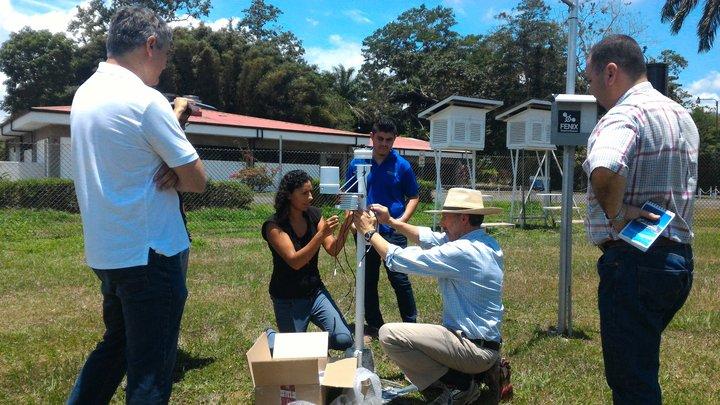Addressing the weather data paradox head-on in Guatemala and Mali

Weather data is vital for climate science, but it is often inaccessible. To solve this, weather stations are being installed in Mali and Guatemala.
Poor availability of weather data is a major problem for testing sustainable options for climate adaptation. To address this issue, weather stations are being installed in eight villages in Mali and six villages in Guatemala in a collaboration between Bioversity International and TAHMO. The weather information will be used in interpreting the results of field trials on hardy underutilized crops following an innovative citizen science approach.
A lack of access to weather data is a major problem for testing sustainable options for climate adaptation. Weather data are the raw material of climate science. Without this information no climate models or analyses of climate adaptation options in agriculture would be possible. Sustainable systems should take into account and adapt to small variations in the environment but detailed knowledge of the environment is required to inform such resource-efficient locally-adapted solutions. In many rural areas of the globe, localized weather information is not recorded. There is also a paradox in that, while more and more weather data are being collected, public weather data availability has actually plummeted as they are zealously kept under lock with the idea that "data are money".
Bioversity International has developed an innovative citizen science approach to test crop materials and technologies that shortcuts lengthy trials on experimental stations which do not fully reflect the diversity of farm conditions. The variation of responses across different environments in these large farmer-led trials contains a lot of information about how different crops and varieties might adapt to future climatic conditions. This possibility is lost, however, if the trial data cannot be combined with detailed weather information, so the missing ingredient of this approach is often weather data.
To overcome this issue, Bioversity International has joined up with The Trans-African HydroMeteorological Observatory (TAHMO), an exciting initiative that is addressing the weather data paradox head-on. They aim to place 20,000 weather stations across Africa and to address other data-sparse areas of the globe. They have developed new weather station technology that is low-maintenance and robust to harsh environments. The stations send weather data through the mobile phone network directly into a large database that is open access for any non-commercial use. So while Bioversity International researchers use the weather data for their on-farm trials, the data they collect will also contribute to other uses, multiplying its value many times.
This spring, TAHMO weather stations were installed in eight villages in Mali and soon they will be installed in six villages in Guatemala to support field trials on underutilized crops. In Guatemala, the data will be used to assess the performance and acceptability of the drought-tolerant tepary bean (Phaseolus acontifolius) alongside the predominant but more drought-susceptible common bean (Phaseolus vulgaris). In Mali, the trials led by l’Institue d’Economie Rurale will focus on fonio (Digitaria sp.) and Bambara groundnut (Vigna subterranea) - two hardy staple crops native to West Africa.
The farmers were excited to see the weather stations installed. Lamine Kone, a farmer in Tominian, Segou, Mali, said “It’s the first time we have seen this kind of station. We hope it will connect us to the worlds’ weather station network. The weather stations will be important as training tools not only for farmers in the village but also for schoolchildren and teachers and will serve the surrounding villages”.
Stefano Padulosi, Project Leader, commenting on the importance of working in partnership with TAHMO said: “Our collaboration with TAHMO is exciting in that it provides a real solution to the weather data paradox. Our project is now ensured of high-quality weather data and at the same time we are contributing to a global public good. It is a win-win situation."
For more information, please contact Gennifer Meldrum
The installation of the TAHMO weather stations was part of the Project “Linking agrobiodiversity value chains, climate adaptation and nutrition: Empowering the poor to manage risk” that is supported by the International Fund for Agricultural Development, the European Union and the CGIAR Research Programme on Climate Change Agriculture and Food Security (CCAFS).
Photo: Bioversity International staff being trained to install and maintain weather stations, Costa Rica. Bioversity International/G. Meldrum
